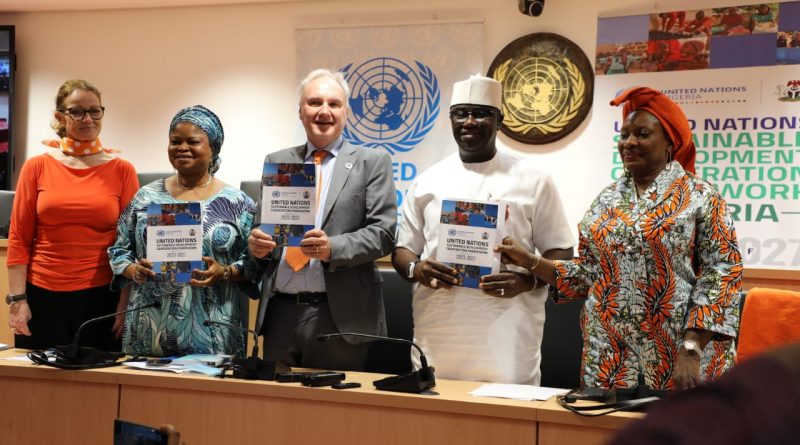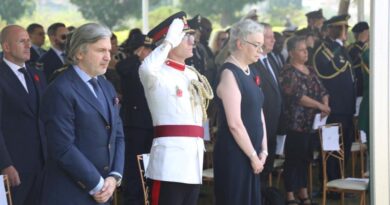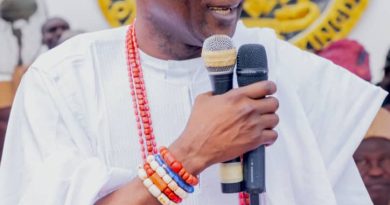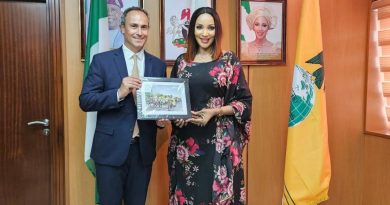UN, FG Sign Framework To Tackle Nigeria’s Challenges
By Bukar Bolori
The United Nations (UN) and Nigeria have signed the Cooperation Framework to address some of the greatest challenges in the country.
Speaking at the signing ceremony, the UN Humanitarian Coordinator in Nigeria, Mr. Matthias Schmale explained that the Cooperation Framework can be seen as the UN’s response to the Government’s plea to support it in addressing Nigeria’s greatest challenges which have been laid out in the current National Development Plan.
He said for instance, by 2025 the Government aims to create 21 million full-time jobs, lift 35 million people out of poverty, and get 5.5 million out-of-school children back into education.
Schmale said: “Your challenges are our challenges, so supporting the Government to overcome these are the focus of our ambitious package of Transformative Initiatives. This is all about synergy, meaning working together in a way that is greater than the total power achieved by each working separately.
He added that: “We must remember that the Charter of the UN starts with “We the Peoples of the United Nations”, which means that we must meet the development aspirations of Nigerian people where they are. We must work on translating the general framework into impactful results for people at local levels.”
He explained that: “What the UN brings to the table to address these challenges is its convening power – including providing safe space for dialogue -, its knowledge base, and its ability to attract some investment.
“The Cooperation Framework unifies our UN agencies’ individiual missions and mandates into a single vision. The aim is to bring the full capacities of the System together to better address the Government’s priorities and the people’s needs.”
He noted that: “The 19 UN agencies who are signatories to the Cooperation Framework must work as efficiently and collectively as possible. This will require sharing resources for the collective good and enhancing our role as a go to trusted advisor for Government and others.”
Schmale asked the Steering Committee which was inaugurated that: “the Cooperation Framework is the main point of reference for our duties of oversight, accountability, and guidance.
“With the Committee set to meet regularly throughout the five-year implementation period, Committee members and the four or more Results Groups reporting into it can reach for this document when assessing progress towards the SDGs, checking alignment with national plans, or identifying gaps in programming. To keep us on course we need your steady hand on the wheel, and, in the Cooperation Framework, you have the map of our route.
“As it stands, we all need to accelerate our current efforts because Nigeria is not on track to achieve the 2030 Agenda. After the disruptions and difficulties caused by COVID-19 and war in Ukraine, we need to quickly begin implementing the new Cooperation Framework.”
Speaking at the occasion, the Minister of State for Finance, Budget and National Planning, Prince Clem Agba said the United Nations Sustainable Development Cooperation Framework was a strategic framework that would assist Nigeria in addressing development and humanitarian challenges, leveraging UN leadership, comparative advantages and capacity assessment.
According to him, “Nigeria is presently in the fifth and final year of the current United Nations Sustainable Development Partnership Framework,” adding that, “with 2023 on the near horizon, it is time to look to the next stage of our development journey.”
Agba noted that United Nations Sustainable Development Cooperation Framework (2023-2027) had been conceived to support the Government and people of Nigeria in their development aspirations for the next five years.
“It is heartwarming to note the extensive collaboration in the development of the framework with valuable inputs from our Ministries, Agencies and Departments, as well as UN Agencies, Academia, Civil Society, the Private Sector, and other key stakeholders.
“The preparation of the document passed through an open and transparent process which inspires confidence and ensures that we are all rowing in the same direction.
“The all-inclusive engagements are akin to those undertaken in the development of Nigeria’s National Development Plan (2021-2025) which the about-to-be-signed-Cooperation-Framework, fits into.
“The avowed mantra of the United Nations to ‘leave no one behind’ is in tandem with the objective of President Muhammadu Buhari’s vision to lift hundred million Nigerians out of poverty.”




